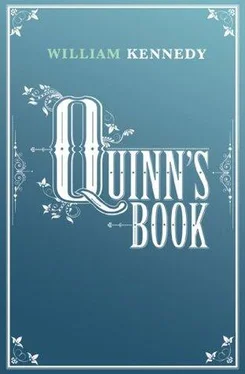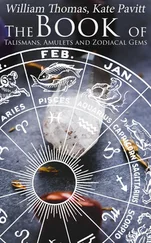Thirty-four cars they occupied, not the longest train I ever saw but the one whose memory is vivid still. We watched until they were all on board. A man of middle years, his shirt in tatters, a half-eaten chicken leg in his hand, stood alone on the steps of the train and began a song in the Gaelic, that strange tongue rendered brilliant by the man’s plaintive voice. Silence came onto the crowd and we listened to the minstrel, I with a growing wonder in my heart at all the joy and misery that simultaneously commanded so many unknown lives. The train whistle interrupted the sound of the song but not the singer, and as the cars moved out, his voice reached us in fragments, audible between the whistle blasts, a fervent melody struggling to be heard. And then it was gone.
While we waited for my train Emmett and I talked of Ireland, and of family, and of my future, and of how I was always welcome at his home, which I well knew, and then my train was there, bound for Saratoga.
I boarded knowing, with every willful step, that I had once and for all obliterated the image of myself as helpless, hapless orphan, tossed off a canalboat like so much off al. Nor was I a greenhorn victim, not anymore. I still do not know why I knew this so firmly, but it was true. It remained to be seen whether fate would again ravage my life, but at the moment luck was with me, and I felt an extraordinary rapture, full of the music of sunrise. As I waved farewell to Emmett, I and my train moved northward with that same boiling energy that we had, at the dawn of the light, stolen from the gods.
The Dumb Cake Saratoga, Spring 1850
WHEN MAGDALENA COLÓN stepped onto the stage at Utica, her first public appearance after leaving Albany, her overarching impulse was to tell the audience of her death and resurrection. But with John’s words strong in her brain, she stifled the urge. What John had said to her was, “You talk of that and they’ll think you’re daft as a bloody owl.”
By Syracuse Magdalena could stifle herself no longer. In a voice reverberating with all the humility of a heavenly choir’s frailest angel, she stepped delicately to center stage and offered her thanks to God for resurrecting her from the dead. She told her story of the child at the bottom of the river who had welcomed her to the birthplace of dreams. She expatiated on her pleasant time under water in the land of luminous dolls and, with a great surge of her mystical wisdom, told her listeners they should not fear crossing over into death, because it was so attractive over there. “Also,” she said, “there is always the chance of turning around and coming right back.” She concluded by saying, “I can’t imagine a more pleasant experience than dying.”
She then went into her performance: a song first, then her famed Spider Dance, in which she shook off an attack of imaginary arachnids that were climbing her skirts and bodice, and in so doing revealed more flesh than was generally provided to American audiences outside of brothels. Alas, her report on the beyond had taken its effect. The audience tittered at her dancing, and her vaunted sinfulness was paled over with an aureole of humbug sanctity.
A Syracuse newspaper reported on Magdalena’s disquisition:
DANCER CLAIMS RESURRECTION
The Spanish dancer Magdalena Colón, who calls herself La Última, performed for an overabundance of spectators last night but failed to arouse either the condemnatory or the lascivious reactions her dancing has produced in other cities. After evoking the Deity by describing Him as a small female child clutching a doll, the dancer spoke of her own experience drowning in the river and of being resurrected from death at a much later hour by the ministrations of love. It might be said of her performance that while it, too, perished, resurrection was not a consequence.
Magdalena, undaunted, repeated her tale to a Rochester audience. By then the word of her bizarre story, and not her sensuality, sold out the house. Hearing the laughter and hooting that met her remarks about resurrection, Magdalena swirled in frenzied pirouettes across the stage and fled into the wings. Witnessing this, hearing the hoots, Maud walked onstage and faced the hostile audience, whose derision subsided at her advent.
“Only fools and martyrs laugh at death,” she said to them. “Which are you?”
She then asked the orchestra leader to play the music for the Spider Dance, and in learned emulation of her aunt she whirled about in recklessly flying skirts, her wild abandon silencing all hooters, and at length provoking them into cheers and long applause as the curtain fell. She took no curtain call. Backstage the wounded Magdalena embraced her, saying, “What a wonderful child you are.”
“I’m not a child any longer, Auntie. No child could dance as I just have.”
“Whatever you are, Maudie mine, I love you.”
“You needn’t go on about that. Go out there now and sing your songs or the theater manager will deny us our money.”
Thus began the stage career of Maud Fallon.
La Última, in subsequent days, experienced a falling off, an attack of despair that prevented her from venturing on to Buffalo. She stopped eating and faded languidly into a vale of melancholy.
“I have lost the voluptuary in me,” she kept saying. “My life is a bore, and in boredom I shall surely die.”
She did not say this to John McGee, especially when he was providing her with the only kindness he fully understood: the thrust of his pelvic appendage. She received his thrust with artificial passion, but such politeness also bored her, and so she eventually accepted John’s largess in immobilized silence.
“You had more life when you were dead,” John told her.
She arose one day from her passionless bed to perform the usual ablution, and the coolness of the water between her legs seemed to renew her spirit. The idea of the healing power of water, so capable of assuaging even the agony of death, preempted all her thought.
“I must have a lake,” she said to John.
“A lake, is it?”
“I must lie in a lake and recover my passion,” she said.
“By the Jesus, I’m all for that,” said John.
And so Saratoga Springs, famed for its lake and its healing spas, famed also as a place where voluptuaries were as commonplace as clover, became the destination of Magdalena, of John the Brawn, and of that chrysalid creature of the future, Maud Fallon.
Upon arriving in Saratoga, Daniel Quinn bought a newspaper and read of the cancellation of Magdalena Colón’s performance that night at the Union Theater. The brief story referred to unexplained noises in the theater during an earlier performance. Quinn went to the theater and found it closed. He went to the print shop where the newspaper was printed and confronted its publisher, Calvin Potts, a small man with a white pigtail, who was wearing an apron stained with a generation’s worth of ink. Potts was working at a type cabinet, a stick of type in his hand, when Quinn introduced himself and handed him the letter Will Canaday had written on his behalf.
“A man of substance, Will Canaday,” Potts said. “You must be worth a scrap of something if he thinks well of you. Did you ever set type for him?”
“Setting type isn’t what I want to do,” said Quinn, and he groped for the word that would define his goal. Editor? Not likely. Writer? Too ambitious. “I think just now I ought to learn how to be a paragraphist,” he said.
“You’d best learn to set those paragraphs in type if you want to earn a living, boy. Words are flimsy things. Type is solid and real.”
“I can see that,” said Quinn. “But paragraphs are also real in their way. I’ve seen how they can change things.”
“Ah, so you’re out to change things.”
Читать дальше












